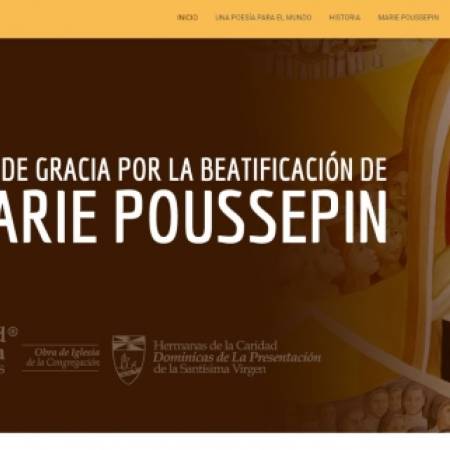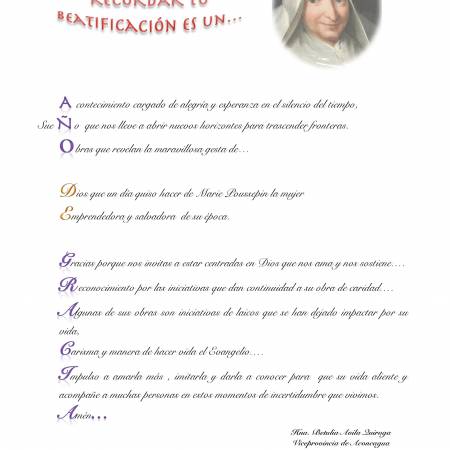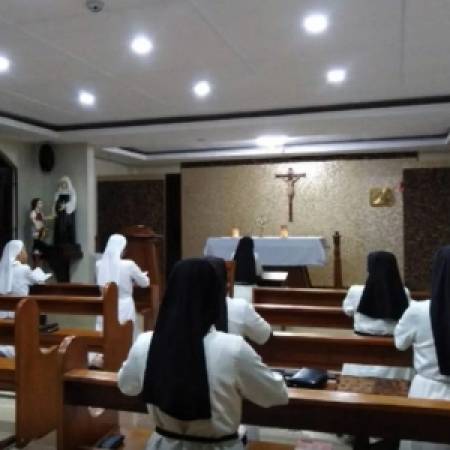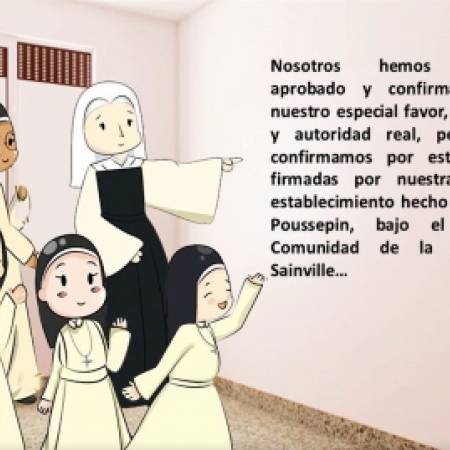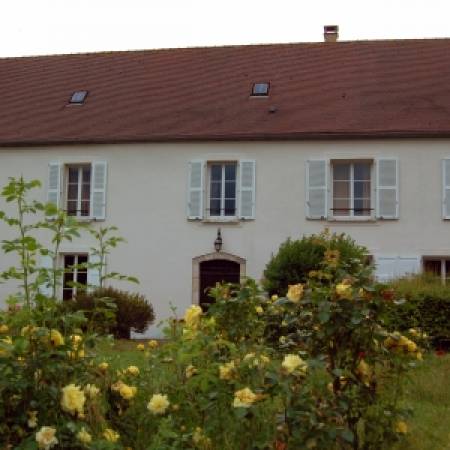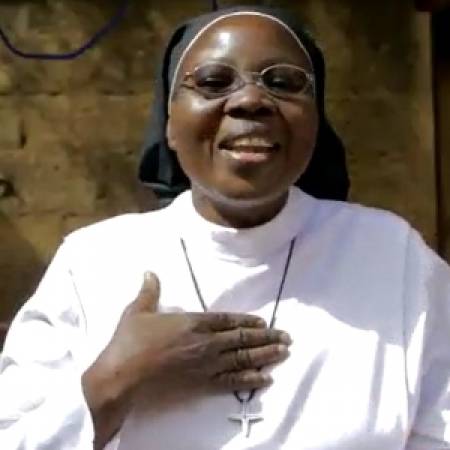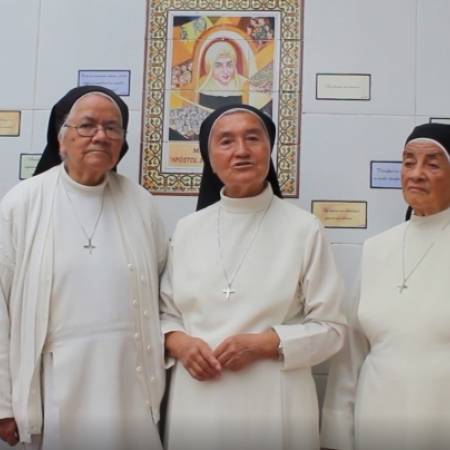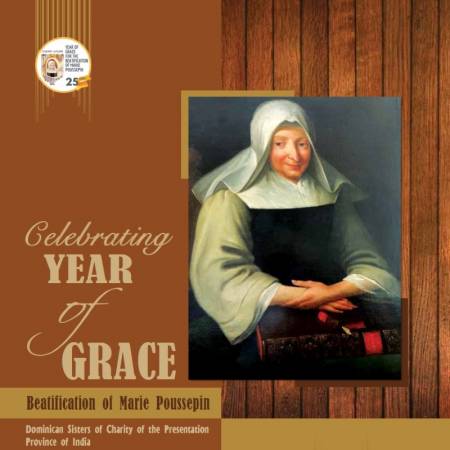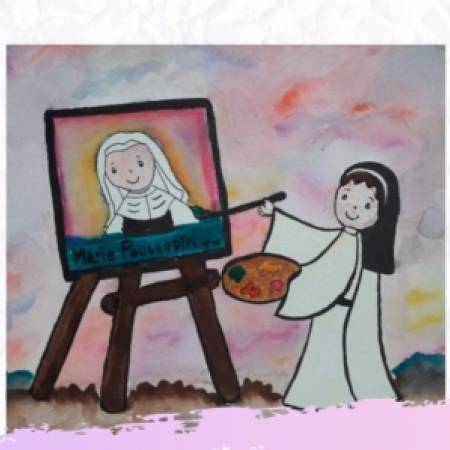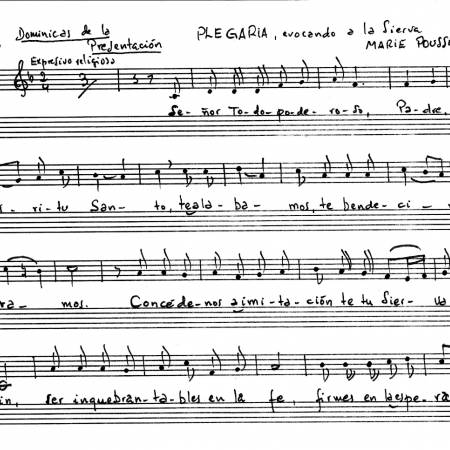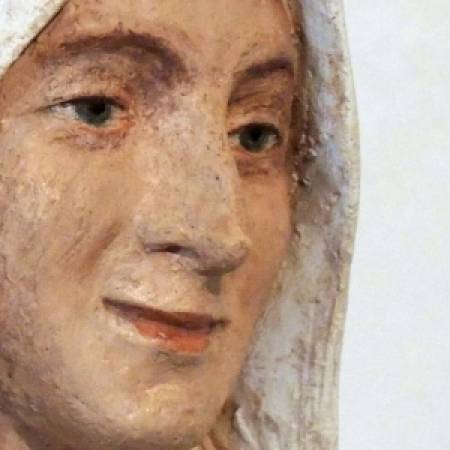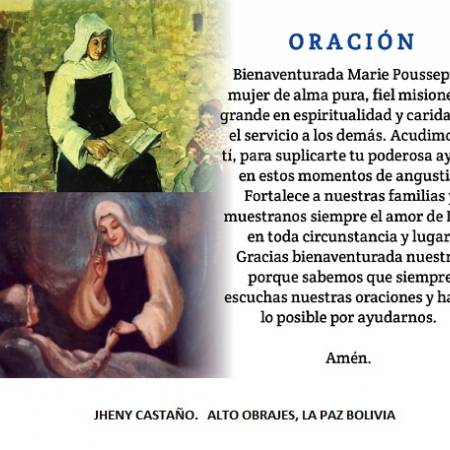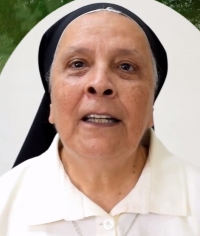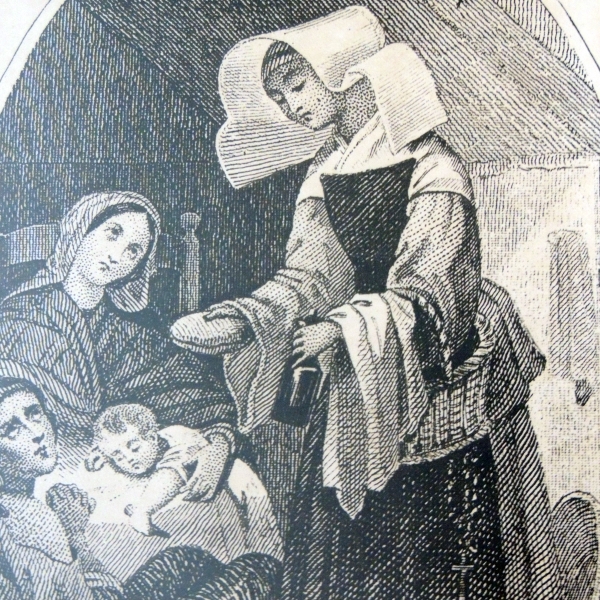Means to come closer to the vitality and experience of the Congregation with eyes that are able to go beyond to feel, discover and taste the life of each sister in her personal story and biography. To reread means to find myself in the narrated life, where I am not the same, because the experiences and the learning lived in the course of the years, enables me to see with new eyes; it also enables me to let others read me and tell me how I have changed.
Accompaniment includes various aspects of the human being, but I want to dwell only on two of them which seem to be very basic and indispensable for our life: Accompaniment during formation to instill personal responsibility and accompaniment during formation for a free, conscious and committed response.
1. Accompaniment during formation to instill personal responsibility which entails to motivate the person and make her responsible for herself and to design her Project of life
To make one responsible for oneself, as far as possible is to achieve or to become what one is and what one chooses to be. This implies the capacity to know oneself and to dedicate oneself to attain it. To know oneself, as much as to accept oneself, being responsible for oneself and engaging oneself without escaping, this in the first place, is a response in trust learned at home, from childhood and then it is transplanted in the community because this is the place to encounter oneself, along with other persons, on the “question on the meaning of life” and the place of Jesus in one’s life.
But these questions not only revolve around one self, but also revolve around others, nature, history and one’s search for the Transcendent.
In the measure in which a person progresses in developing her potential for action and grows in her sense of belonging, her uniqueness, self-assurance and self-determination, she develops her personality. She avoids being blended into the other and weaken her own self-esteem; she masters her own identity, faces her own self, succeeds to have better awareness to judge, choose, act and become what she wants to be. We need to realize that only by giving one the possibility to act, she develops the potential for decision making and strengthens her capacity.
The one who accompanies, guarantees her the conditions, contexts and processes which will enable the person to emerge as genuine and distinct from the others, to remain rooted in the natural world and at the same time to transcend and overcome limits, barriers and interests that she may face. But it is in this mystery of the inexpressible, ambiguous, unique and boundless wherein lies the core of the responsibility and the personalizing dynamics which make it possible to be accompanied in the passage from childhood to the responsibility of the adult: “When I was a child, I used to talk as a child, think as a child, reason as a child.” (I Cor.13, 11) Growth in emotional and affective autonomy, critical thinking, ethical sense and social sensitivity enables the person to cut the umbilical cord, not to be discouraged by the opinion of others and act like an adult.
Marie Poussepin, “… took two little orphans with her and, later, a third one. It was sister Agnes, her cousin…”, (B. Préteseille, p. 85) and accompanied them in this slow, simple and patient process… She guarantees the conditions and contexts which was necessary for their life and which she knows; she initiates processes that will enable the young to emerge themselves as genuine and distinct from others, be agents of their own history, love their roots, transcend and overcome the limits and barriers which could stop them. Her pedagogical program surpasses that of the Ordinance of Louis XIV, …besides catechism, Reading of Scriptures…arithmetic… she added a professional formation: “showing them and teaching them how to make stockings and other things in silk and wool.” … (B. Préteseille, p.101) These young women integrated everything and in 1697, already two sisters were sent to the Hospital of Janville, which had just been reorganized. In this accompaniment, we find the core of the responsibility that enables the person the passage from childhood to responsibility as of an adult.
2. Accompaniment during formation for a free, conscious and committed response to Jesus
Faced with the “mystery of the other,” the “word of the other” emerges as revelation, as vocation, as capacity for an autonomous, vital, free and deliberate response. (Fr. J.J Sedano G, 1996, p.p. 20-21) To face this reality, the person who accompanies teaches others to try and explore various possibilities, look for meaning, search for truth that emerges in order guide one’s life to the unique purpose in identifying one’s vocation.
Marie Poussepin, with her fine intuition, “intends to establish with a few poor girls of the surrounding country side, ‘a Community of the Third Order of St. Dominic’…” (C. Original Vision, page 11). She picks up the youth who will accompany her in the mission to proclaim and reveal Jesus Christ, by imitating his life. We see, how Vocation which, at the beginning was expressed as a restlessness and a desire to be what questions deep within, is intensified by contact with the suffering and the reality of Sainville… and how it touches in the privacy of one’s conscience and challenges one to make a decision.
Within this personal reality, the commitment with others and with the sisters, is a learning. It is learning to respond, giving oneself and making oneself responsible in an interpersonal way for the commitment made to one’s life and to the life of others, in reciprocity and communication: can I count on you? Can I trust you?... This is the basis for accompaniment among equals. It is an indispensable way for the formation of inner security; it is necessary to acquire interpersonal affective maturity. The sincere gift of oneself to others, is a journey towards growth in the person’s maturity and it is expressed with others, with oneself, with the reality and with God. For this, Marie Poussepin wishes that her Community be founded in Christ and fraternal relationships which deepen what unites and where she discovers each sisters’ need in her process of becoming her true self.
This commitment, goes further; it is a matter of responding to the needs of the moment: war, hunger, epidemics, ignorance and illness; it is the encounter with what is cultural and natural and with others through the experience of openness to these realities and to God. This is the time to live the service of charity.
Then, it means to accompany the process of learning to decide, teaching to commit oneself, committing oneself and moving from indecisiveness to choice and action: “ called to follow Christ in the total gift of our being… to live and die in the service of the Church, in the exercise of charity” (C1) This response of our commitment should be accompanied throughout our life.
ACCOMPANIMENT OF JESUS
He accompanies his disciples: Jesus accompanies each one as a person, He chooses them to live with Him; they are men who are extremely different; He acts with them, as the Father does with Him (cf. Jn 10: 14 – 15). He establishes intimate personal contacts, starting from where they are, to bring them to growth and deeper communion. He forms a community with them and the principle of their life as a group is “to be with Him”, (Cf. Mk. 3: 13) to be his companions and his friends… He puts His trust in them and prompts a response from them. Thus, he entrusts them with his mission: to proclaim the Good News. He accompanies in their human formation and the person emerges from within.
Jesus accompanies, in seeking the Will of the Father: Everybody has her time and everything has its time; the time of Jesus is a fresh time in His experience, the time for accompaniment and witness to the Gospel.
In the experience of a “new word” that points to Him as “The Beloved Son, to whom everything is entrusted” (Mk. 1: 9 – 11). He perceives in discernment that the “will of the Father” is that the center of his preaching and witness should focus from now on the excluded, the not so pure and the suffering part of the humanity. He will dedicate Himself entirely to them so that through him, they may experience the closeness of the Father in His liberating and transforming presence.
From this experience, emerges His availability for accompaniment: Accompaniment as acceptance that recognizes and heals. Jesus opens a house of hospitality and social inclusion (Mk. 1: 21 and 35), a place known for all as “house” of Jesus, in which he preaches and heals (Mk. 2: 1 – 12); these are clear indications of an accompaniment which makes us feel equals, heals and opens doors. The mode of accompaniment opens the community to others, which is indispensable in the search of oneself; openness to dialogue, forgiveness and gratitude are indispensable conditions to build a “home”, in the community.
He accompanies in the process of conversion and search for God’s design for each one. People discover a coherent response in Jesus to their expectations; because of this, they follow him (Mk. 6: 2 – 3) and experience the compassionate and transforming power of the Father(Mt. 18: 5 – 10). He teaches them and shows them the way to reach the Father. So far as the Father’s will is concerned, His position is clear and convincing.
Marie Poussepin adheres to the person of Jesus, He is at the center of her life. He is the one who accompanies her and through Him, Marie discovers the grace to be: “the work of the Providence.”
MARIE POUSSEPIN ACOMPANIES
- Spirituality of the charity of her sisters: solidarity and human dignity
What is being lived today in many places of marginalization in the world, Jesus had already lived it during his time and also Marie Poussepin lived the consequences of the War: real poverty. In the measure in which she progresses and matures, seeks to satisfy her thirst, assuming radical life of the Gospel. She does not permit individualism to prevail over the requirements for following Jesus. Through her life, she accompanies her sisters in solidarity and constant effort so that they may become a gratuitous gift to themselves and to the people of the village.
- She points the Lord out and accompanies them to see, feel and follow
One makes a choice for Jesus, through the Congregation, to live the same life of the apostles and to be encountered by Him: “It was not you who chose me, but I who chose you and appointed you to go and bear fruit that will remain” (Jn 15: 16). To accompany means also to indicate “Behold, the Lamb of God…” (Jn. 1: 36). and to surrender. (Cf. Jn. 1: 37). The narrative of Jn 1: 35-42, makes it tangible; moreover, indicating the way, it enables them to follow Jesus and to remain with Him…Marie Poussepin invites her sisters to form a community around the Lord. Before, choosing to follow Him, she warns them about the difficulties, life-style and its demands, possible risks and the need to adhere and assume the consequences (Jn 8: 12; 10:4; 12: 26; 13: 36). However, it is not enough to follow Him; one has to adhere to Him in a trustworthy manner (Jn 2: 23-25). With the question “where do you live”, the disciples and the sisters, express the desire to remain in intimacy with Jesus, according to the life- style conceived by Marie Poussepin.
Even though, she has her house in “Caparnaum”, the frontiers of her work go beyond those of Sainville (Mt. 8: 20). Her service of charity is spread over the whole world; it extends to people of good will (Mt.2: 50). Wherever there is a need to witness the Kingdom, there, is the place for the Congregation to offer a witness of accompaniment (Lk. 2: 49).
- She accompanies us in our Consecration for the Kingdom of God and in building a community of charity.
Long hours of prayer and uncertainty preceded the decisions of Marie Poussepin, when she left Dourdan to consecrate herself fully along with her sisters, to give dignity to the poorest. It is a call to live the Gospel radically, to become the Good News and to give meaning to a life with a hopeful future and the possibility to be transformed and to transform (Is 40:9; 52:7; Mk. 1: 1-1, 14). She accompanies in the formation of a welcoming and joyful community: (Lk. 11: 5-8; 12: 42-46; Lk. 15: 11-32), the House, community and the temple (Mk 14: 52) of meeting for the sisters and the persons who are connected through service, solidarity and forgiveness. It is founded on a common filial relationship with Jesus (Jn 18: 36).
PERSONAL REFLECTION
- Confront your personal life with the anthropological sense of accompaniment presented in the text.
- Which are the means that Jesus and Marie Poussepin offer us in the experience of accompaniment?
- With reference to the text, how do you find your community in the experience of accompaniment?
Bibliographical References
- Préteseille Bernard, Marie Poussepin or the exercise of charity, Tours-France.
- Constitutions and Ordinances of Dominican Sisters of Charity of the Presentation of the Blessed Virgin, (2010) Tours- France.
- Fr. Nolan, Albert (2001), Jesus before Christianity, New York, Orbis Books.
- Fr. Sedano, J.J (1996), Hacia una educación de la respuesta. Perspectivas pedagógicas de Tomás de Aquino. (Towards an education for the response. Pedagogical perspectives of Thomas Aquinas) Bucaramanga, Biblioteca Dominicana, Convento Cristo Rey.
- Fr. Sedano, J.J (1998). Servidores de la Palabra. Encuentros con la familia dominicana en América Latina. (Servants of the Word. Meetings of the Dominican Family in Latin America) Bucaramanga, Testimonium Veritatis No 2, Convento Cristo Rey.


 EN
EN  ES
ES  FR
FR 




